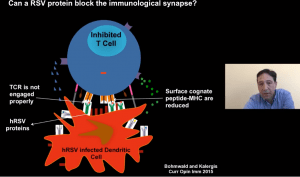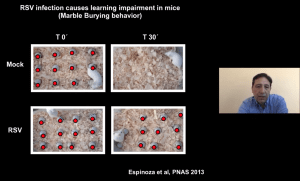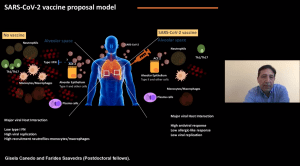This article summarises the last IUIS COVID-19 webinar which featured a talk by Alexis Kalergis on “Impairment of the immunological and neurological synapses by respiratory viruses.” and the implications for the design of vaccines .
He began his talk emphasising the importance of vaccines and their role in controlling and reducing the incidence of disease. He also showcased the Museum for Immunology & Vaccination (see youtube video). Highlights of his immunological talk include:
 The role of dendritic cells (DCs) in priming cellular (classical T cell) immunity. He described how viruses interfere with DCs activity by blocking DC-T cell immunological synapses in viral infected DCs resulting in reduced T cell activation. He then described in detail how Respiratory syncytial virus (RSV) induce DC impairment. He then described how understanding RSV virulence contributed to the development of vaccines that are currently in human clinical trials.
The role of dendritic cells (DCs) in priming cellular (classical T cell) immunity. He described how viruses interfere with DCs activity by blocking DC-T cell immunological synapses in viral infected DCs resulting in reduced T cell activation. He then described in detail how Respiratory syncytial virus (RSV) induce DC impairment. He then described how understanding RSV virulence contributed to the development of vaccines that are currently in human clinical trials.
He then gave an overview of SARS-CoV-2 and pathologies associated with infection. He highlighted that SARS-CoV-2 also affects the central nervous system, a similar pathology also observed upon RSV infection, where murine models have shown that RSV leads to cognitive impairment. This cognitive impairment is associated with a disruption of the blood-brain barrier. Pre-clinical murine vaccination against RSV has shown that this cognitive impairment is prevented in vaccinated mice.
The end of his talk focused on describing current research on developing a SARS-CoV-2 vaccine, as well as research his group is conducting that aims to develop a vaccine that can induce immunity against SARS-CoV-2 nucleocapsid, envelope, membrane and spike proteins.
Summary by Cheleka Mpande












